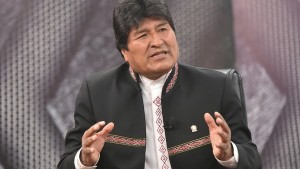 Carlos Sánchez Berzaín
Carlos Sánchez Berzaín
September 18, 2018
(Interamerican Institute for Democracy) All criminal schemes to indefinitely hold on to power that were previously used in Cuba, Venezuela, and Nicaragua are now being applied in Bolivia. It is an effort for Evo Morales to be a candidate, because he has ensured his victory in the 2019 elections with yet one other event “to simulate democracy” and through the violation of Human Rights of an entire nation. For Castroist Chavist dictatorships, it is indispensable to keep Bolivia under their control and so they repeat the crimes with which they subjugate Cuba, Venezuela, and Nicaragua.
Evo Morales supplanted the Republic of Bolivia’s constitution -it did not allow the continuous reelection of a President- misrepresenting the content of a constitutional reform through Law 2631 of 20 February of 2004 promulgated by Carlos Mesa who without legal competence authorized the convening of a Constituent Assembly when only the partial reform of the constitutions was allowed. With a fraudulent Constituent Assembly in place they brought to the forefront the construction of the Plurinational State that eliminated the Republic of Bolivia with a constitution that is not the one drafted by the Constituent Assembly, because through one other crime yet, the so-called Law 3941 of 21 October of 2008, Morales imposed a different text from the Constituent Assembly’s version in an ordinary session of Congress that usurped roles. A series of repeated crimes that created “the lawfulness of the dictatorship”.
On 2008, the opposition was the majority in the Senate (Jorge Quiroga led 13 and Doria Medina led 1, a majority of 14 from 27) and could have prevented the elimination of the Republic, however, there was an agreement with Morales, Law 3941 was approved and the Castroist Chavist Constitution was proclaimed as one of national unity, clearing the way for Morales’ re-election. The people, along with civic leaders, Governors of six out of nine departments, resisted but Morales overpowered them with several deaths, political prisoners and exiles, with the massacres at Las Americas Hotel, Porvenir in the Northern department of Pando, La Calancha in Sucre, Cochabamba, and more. Another series of repeated crimes that created a “functional (subservient) opposition”.
With his Plurinational Constitution of 7 February of 2009, Morales immediately called for elections and re-elected himself for “only one time” on 6 December of 2009. He, however, ran again in the 2014 elections. Formal complaints from the opposition who invoked a document in which Morales committed to be re-elected only one time and guaranteed by Insulza’s OAS, were blatantly ignored. The regime’s Constitutional Tribunal had issued a ruling authorizing his third consecutive candidacy with the argument that since the Plurinational State had been created in 2009, the 2014 election was Morales’ first reelection in the new country.
After taking on his so-called third mandate, Morales called for a referendum election in which YES meant his indefinite perpetuation in power and NO meant that he would not be allowed to be a candidate again. Morales indicated that if the “Yes” would lose, he would go back to his illegal coca leaf harvesting. On 21 February of 2016 the “NO” won, and Bolivia said NO. In-spite of the dictatorial fraud, the Bolivian people’s victory at the polls was resounding, but this is when the criminal schemes used in Cuba, Venezuela, and Nicaragua were applied.
Of the thousands of Castroist crimes committed to hold on to power in Cuba, one that stands out is the alleged accident in which they killed Osvaldo Paya, founder and organizer of the “Varela Project” through which and under the protection of the Castroist Constitution, he collected the needed signatures to present to the regime a request for changes. Evo Morales has been accused at The Hague, for the 16 April of 2009 extrajudicial assassinations at the Las Americas Hotel in Santa Cruz and is being held accountable and must respond for dozens of crimes he has committed to take, and hold on to, power.
On 2 December of 2007, Venezuela said NO to Hugo Chavez and his Constitution project and the dictator conceded “defeat only for now”, and then manipulating fraudulent electoral processes, subjugated judges, using force, fear, bribery, and Castroist’s methodology, he did what he wanted, manipulated a new referendum in 2009 and remained in power until his death.
Nicaragua, with the experience of the Somoza dictatorship, was constitutionally protected, but Daniel Ortega first lowered to 35% the percentage needed to be elected, then controlled the electoral institutions, gained support from opposition members in exchange for their impunity on matters of corruption, and was able to have “his human right to indefinitely run for President” acknowledged through a ruling from a subservient Tribunal, and staged a judicial coup in order to control Congress.
Crimes of the Cuban, Venezuelan, and Nicaraguan dictatorships are being repeated in Bolivia to hold on to power, but will the results be repeated? Bolivian people are mobilizing, they have taken the streets and are ready for a civil resistance campaign and the world cannot ignore it.
*Attorney & Political Scientist. Director of the Interamerican Institute for Democracy.
Published in Spanish by infobae.com on September 16, 2018
Translated from Spanish by; Edgar L. Terrazas, member of the American Translators’ Association, ATA # 234680.
 Carlos Sanchez Berzain Abogado | Estadista | Político | Politólogo
Carlos Sanchez Berzain Abogado | Estadista | Político | Politólogo